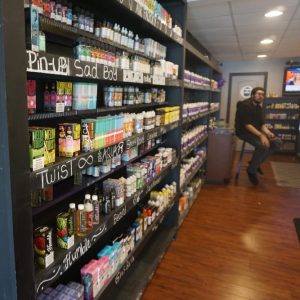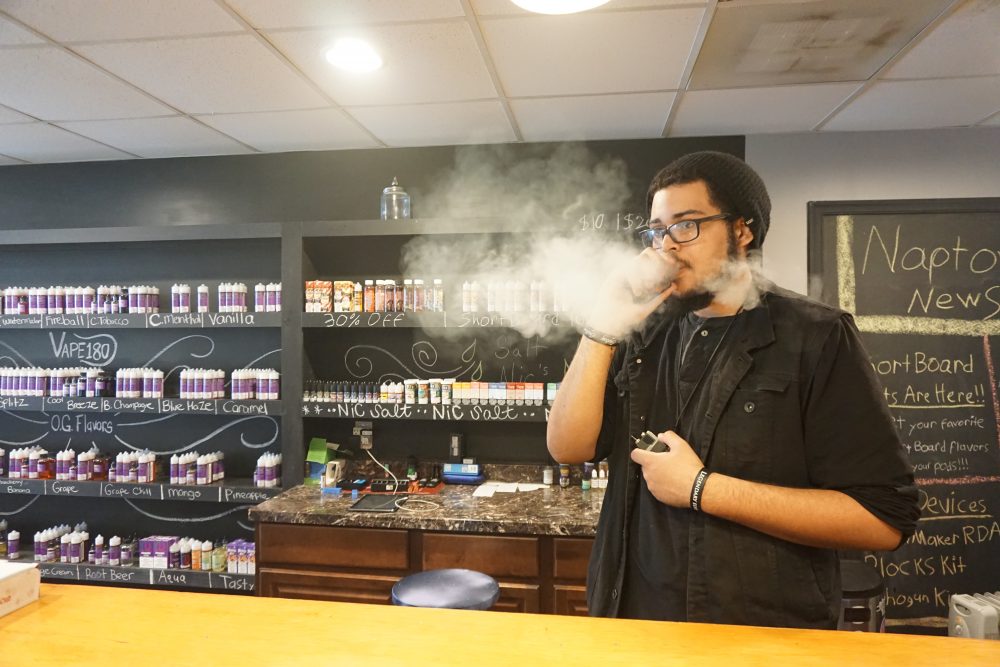ANNAPOLIS, Maryland — What do cigarettes, Juul pods, rolling papers and nicotine-free vape juice all have in common? Starting Oct. 1 they will all be considered “tobacco products” in Maryland, and you will have to be at least 21 to buy them.
House bill 1169 and its corresponding Senate bill 895 will raise the smoking age in Maryland to 21 as well as reclassify all vape products and accessories as tobacco products regardless of their nicotine concentration.
Vendors will still be able to sell tobacco products to active duty service members who are at least 18 with military IDs.
Vapes have become a serious issue in schools, where their popularity has shot up in recent years. Usage of vapes by high school students nearly doubled last year, increasing from 11 percent in 2017 to almost 21 percent in 2018, according to the United States Surgeon General.
While vapes are popular among adults trying to quit smoking, they still present the risk of nicotine addiction. Though studies of their long-term effects are lacking, vapes have been deemed dangerous for children by the Centers for Disease Control and Prevention in Atlanta.
Under this bill, selling tobacco products without a license could result in fines up to $1,000 and/or 30 days imprisonment. Licensed retailers who sell to people younger than 21 could face a $300 fine for their first offense, $1,000 for the second offense within two years of the first and $3,000 for a third offense within two years of the second.
Devin Farmer is a store supervisor at VAPE180 in Annapolis, Maryland. Farmer said he can understand why lawmakers would want to regulate the growing industry with teen vaping on the rise.
Though plenty of people between 18 and 21 frequent Farmer’s store, he said they have enough regulars over the age of 21 that the store should stay in business.
“While (this legislation) will cut back on us a little bit, it shouldn’t do too much damage to our actual business,” Farmer said.
The bill also authorizes the Maryland Department of Health to use people younger than 21 to conduct unannounced inspections of tobacco product retailers. Farmer said he’s experienced similar sting operations working at gas stations, but never at his vape shop.
Farmer said this practice could potentially work, “Maybe kind of as a scare tactic, maybe a once here and there kind of thing. I wouldn’t make it a normal, everyday kind of occurrence,” he said.
Annapolis resident and former vape store worker Ben Sloskey said he thinks this bill would not only be detrimental to the vapor industry, but also relatively ineffective at preventing teen vaping.
When he worked as a vape retailer, Sloskey said, most of his customers were primarily 18-22 and new to nicotine, or former smokers well into their 30’s. Recalling how easy it was for him to find cigarettes as a teenager, Sloskey said high school students will either go out-of-state or simply pay adults to purchase vape products for them.
In 11 other states including Virginia, as well as the District of Columbia, the age to purchase tobacco has been raised to 21, according to tobaccofreekids.org. Delaware and Pennsylvania are among other states considering this change.
“How does the 18-year-old senior get alcohol for his party? He talks to a family relative or he talks to his friend,” Sloskey said. “There are people in high school who have an older group of friends because of something that they do in their free time,” he said.
Because this bill would also restrict people younger than 21 from entering a vape shop, Sloskey said younger children may begin to purchase fake IDs, not to get into bars, but to smoke and vape, he said.

Britani Ngo just turned 20 and has been vaping for about two years since she made the switch from cigarettes. As the store supervisor of VAPE180’s Linthicum, Maryland, branch, Ngo said she’s concerned about what this bill may do to her ability to work.
“Hopefully I can stay, but if it comes down to it, I don’t have much of a choice other than to really leave,” Ngo said. “Honestly, I’m just really scared. I hope for the best, I really hope I don’t have to lose my job because this job means everything to me,” she said.
Ngo said she also doubts that this bill will prevent people who are not yet 21 from getting access to vape products.
“People are underestimating just how easy it is to kinda get your hands on things nowadays. To be realistic, if there’s a will there’s a way,” Ngo said.
Ngo and Sloskey both stressed that vaping is often overlooked as a hobby and lifestyle. Sloskey noted the effort vape enthusiasts put into selecting and building their vapes to produce different results while Ngo explained that her store acts as more of a lounge than a place of intoxication.
“Wanting to be able to help people and then having somebody say I can’t help people under a certain age, that’s just kind of a blow in the chest to me,” Ngo said. “I do know a lot of people underage that smoke and eventually it’s just going to get worse and worse,” she said.
Julia Cen Chen-Sankey is a postdoctoral fellow with the National Institutes of Health. While researching her doctoral dissertation at the University of Maryland, Chen-Sankey said that she found sweet vape flavors can act as a gateway into other tobacco products for young users.
High school students make up the largest group of vape users in the United States, with sweet flavors like fruits and desserts being the most popular with young users, Chen-Sankey explained.
While this bill will likely reduce the number of vaping high school students, Chen-Sankey said, restrictions on sweet flavors and marketing could further aid in preventing underage usage.
Chen-Sankey explained that even in products labeled nicotine-free, some traces of the chemical may still be present, or the packaging could be mislabeled. She said that the broad tobacco product classifications put in place by this bill would ensure that consumers are aware of the health risks of vaping, regardless of what they are purchasing.
A pair of failed bills this session—House bill 1185 and Senate bill 708—would have restricted vape packaging to exclude cartoons, teen mascots and other imagery deemed appealing to children.
“I’d like to see (the vapor industry) keep growing as it has. There’s honestly not a place in Maryland you can go without seeing a vape shop nowadays. They’re everywhere,” Farmer said.


You must be logged in to post a comment.